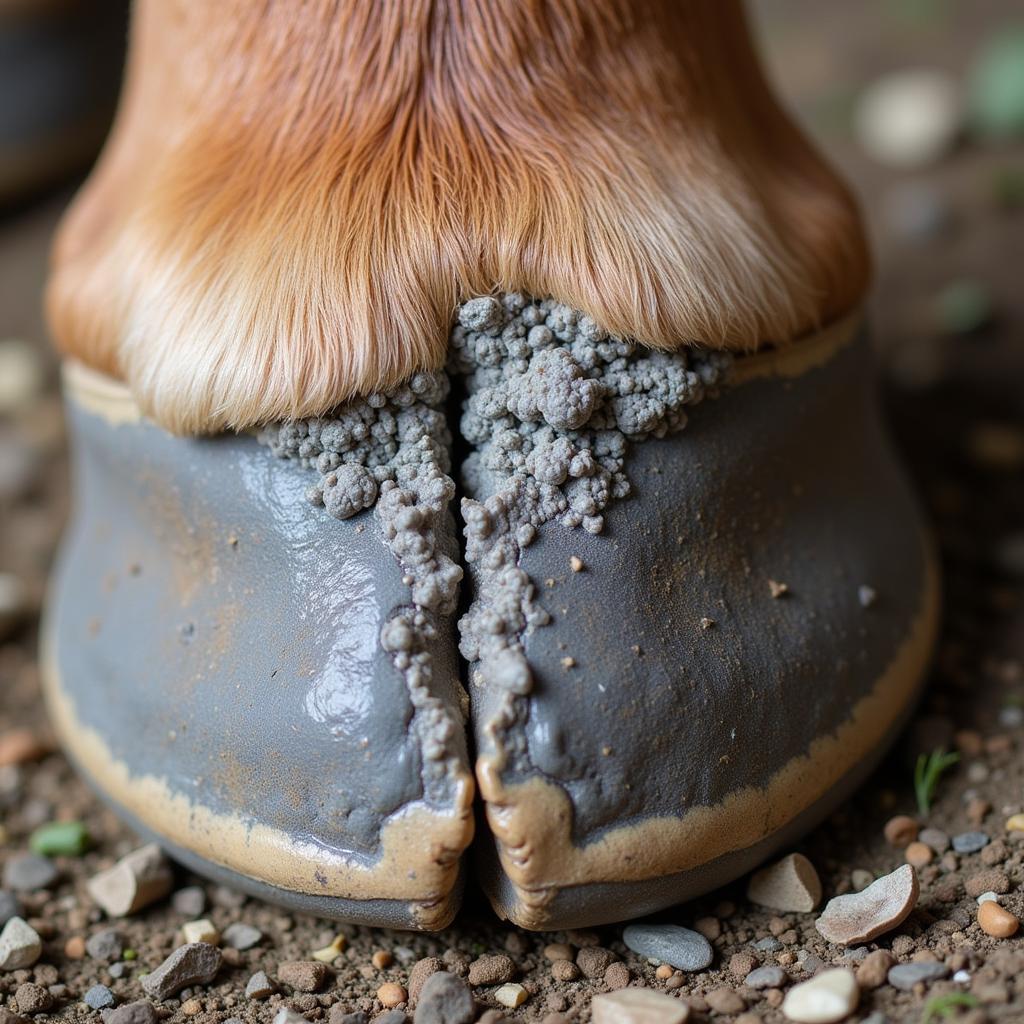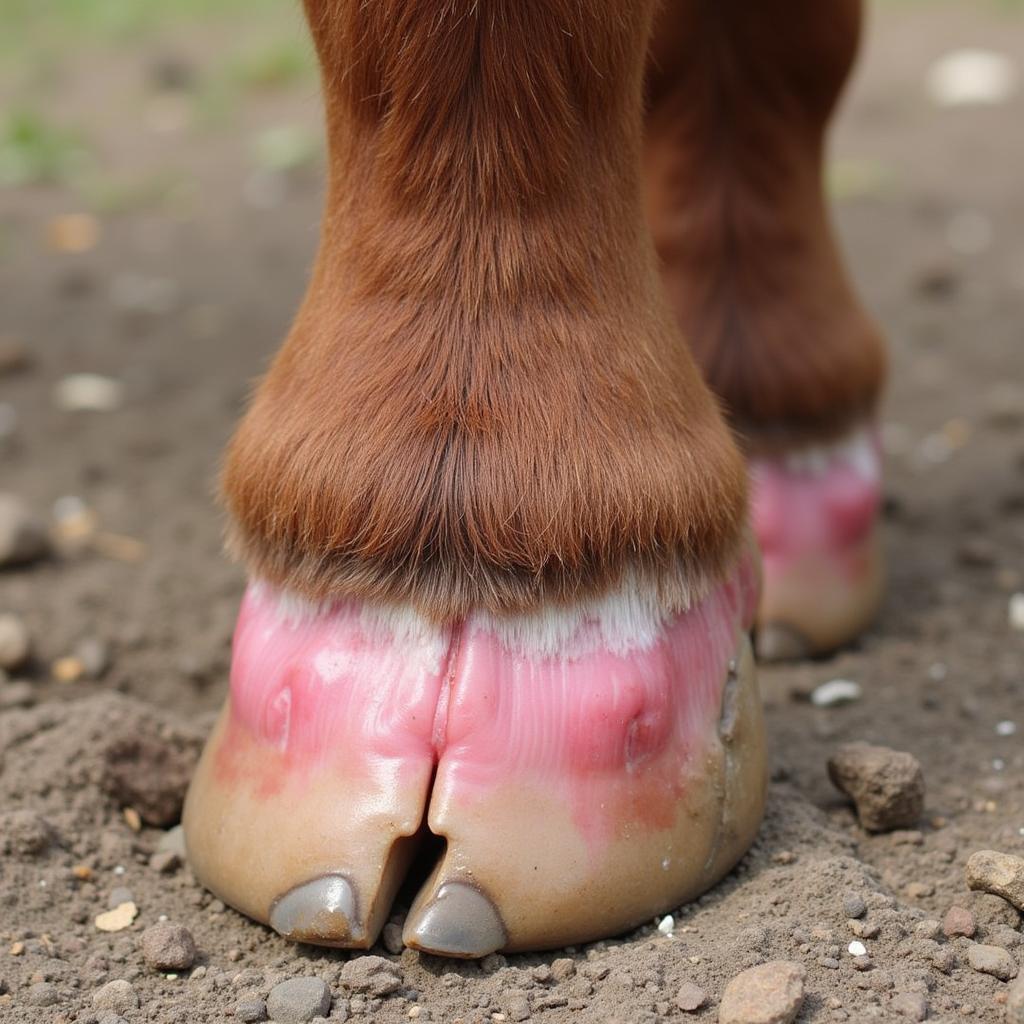Canker in horse feet is a chronic, progressive disease of the frog and sole, characterized by a foul-smelling, abnormal growth of tissue. It’s a serious condition that can cause lameness and discomfort, requiring careful management and treatment. This comprehensive guide will delve into the causes, symptoms, diagnosis, and treatment of canker, empowering horse owners with the knowledge to address this challenging condition effectively.
What Causes Canker in Horses?
While the exact cause of canker remains unknown, several factors are believed to contribute to its development. A compromised immune system, poor hygiene, and persistently wet or unsanitary stable conditions can create a breeding ground for the bacteria associated with canker. Genetics may also play a role, with some horses appearing more susceptible than others. Furthermore, injuries to the frog or sole can create an entry point for infection, increasing the risk of canker.
Recognizing the Symptoms of Canker
Early diagnosis is crucial for effective canker treatment. Look for these key signs:
- A strong, foul odor emanating from the affected foot
- Abnormal, cauliflower-like tissue growth in the frog or sole
- Lameness, especially in wet or muddy conditions
- Discharge, often grayish-white or tinged with blood
- Sensitivity to touch in the affected area
 Horse foot exhibiting common canker symptoms
Horse foot exhibiting common canker symptoms
Diagnosing Canker: A Veterinarian’s Perspective
Diagnosing canker requires a thorough examination by a veterinarian. They will assess the visual appearance of the foot, checking for the characteristic abnormal tissue growth and evaluating the extent of the infection. In some cases, a biopsy may be necessary to confirm the diagnosis and rule out other conditions with similar symptoms.
Expert Insight from Dr. Emily Carter, DVM, DACVS
“Canker can often be mistaken for other foot conditions, such as thrush or abscesses. A definitive diagnosis is crucial for developing an appropriate treatment plan. Biopsies can help differentiate canker from other diseases and guide treatment decisions.”
Treatment Options for Canker in Horses
Treating canker requires a multifaceted approach, combining meticulous foot care with medical interventions. Surgical debridement, removing the affected tissue, is often the first step. This is typically followed by topical medications, such as antiseptics and astringents, to control infection and promote healing. Bandaging is essential to protect the treated area and maintain a clean environment.
Long-Term Management of Canker
Canker is a chronic condition that requires ongoing management. Regular foot care, including trimming and cleaning, is paramount. Maintaining dry and sanitary stable conditions is also essential to prevent recurrence. Owners should work closely with their veterinarian to monitor the horse’s progress and adjust the treatment plan as needed.
Expert Insight from Dr. David Miller, DVM
“Canker treatment requires patience and diligence. Consistent foot care and hygiene are critical for long-term success. Owners should be prepared for a lengthy treatment process and work closely with their veterinarian to ensure the best outcome.”
Prevention Strategies for Canker
While not all cases of canker are preventable, implementing good hygiene practices can significantly reduce the risk. Regular hoof cleaning, especially after exposure to wet or muddy conditions, is crucial. Providing dry and well-ventilated stalls can help create a less hospitable environment for the bacteria associated with canker. Routine farrier care is also essential for maintaining healthy hooves and preventing cracks or injuries that could serve as entry points for infection.
 Healthy horse foot post-canker treatment
Healthy horse foot post-canker treatment
Conclusion: Taking Control of Canker in Your Horse’s Feet
Canker is a challenging condition, but with proper diagnosis, treatment, and management, horses can recover and lead comfortable lives. By understanding the causes, symptoms, and treatment options, horse owners can take proactive steps to protect their animals from this debilitating disease. Early intervention and consistent care are key to successful canker treatment.
FAQs
- Is canker contagious? While not directly contagious from horse to horse, the environmental conditions that contribute to canker can affect multiple horses in a shared environment.
- How long does canker treatment take? Treatment can take several months, and in some cases, even longer, depending on the severity of the condition.
- Can canker be cured completely? With diligent treatment and management, canker can be controlled and the horse can return to soundness. However, recurrence is possible if preventative measures are not followed.
- What is the prognosis for horses with canker? The prognosis varies depending on the severity and chronicity of the condition. Early diagnosis and aggressive treatment generally offer a better prognosis.
- What are the long-term implications of canker? If left untreated, canker can lead to chronic lameness and significant discomfort. Early intervention is key to minimizing long-term complications.
- How can I prevent canker in my horses? Maintaining a clean, dry environment and providing regular hoof care are crucial preventative measures.
- What should I do if I suspect my horse has canker? Contact your veterinarian immediately for a proper diagnosis and treatment plan.
Need help with canker or other equine health concerns? Contact Justus Horses USA at 0772127271, email us at [email protected] or visit us at QGM2+WX2, Vị Trung, Vị Thuỷ, Hậu Giang, Vietnam. Our 24/7 customer support team is here to assist you. Also, check out our other helpful articles on horse hoof care and common equine ailments on our website.